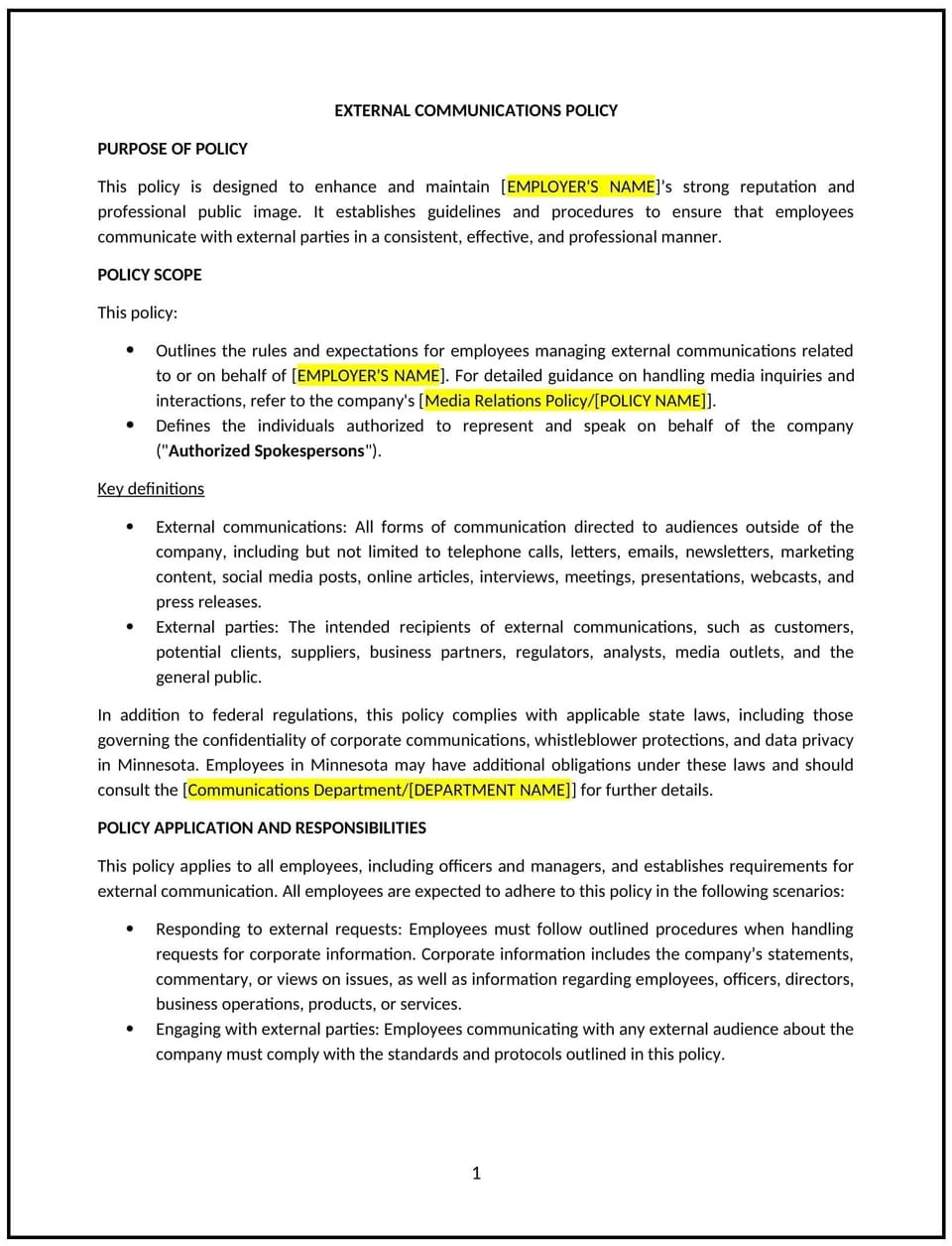External communications policy (Minnesota): Free template

External communications policy (Minnesota)
This external communications policy is designed to help Minnesota businesses establish guidelines for communicating with the public, media, and other external stakeholders. It outlines the roles and responsibilities of employees regarding external communications, ensuring consistency, accuracy, and alignment with the company’s values and objectives.
By implementing this policy, businesses can protect their brand reputation, manage public perception, and maintain professional and effective communication with external parties.
How to use this external communications policy (Minnesota)
- Define external communication channels: Specify the various platforms and channels for external communication, such as press releases, social media, public statements, and official company websites.
- Assign spokesperson roles: Designate key personnel responsible for handling external communications, such as the CEO, PR manager, or communication director, ensuring that only authorized individuals speak on behalf of the company.
- Set content guidelines: Outline the standards for tone, language, and messaging to ensure consistency across all communications. This may include avoiding certain sensitive topics or adhering to a specific style guide.
- Establish crisis communication procedures: Detail the steps for communicating during a crisis or emergency situation, ensuring that information is timely, accurate, and coordinated.
- Clarify employee participation: Specify whether employees can engage in external communication on behalf of the company, and under what circumstances (e.g., through company blogs, social media posts, or public forums).
- Address confidentiality and privacy: Ensure that employees are aware of the importance of protecting confidential or sensitive company information when communicating externally.
Benefits of using an external communications policy (Minnesota)
Implementing this policy provides several advantages for Minnesota businesses:
- Protects brand reputation: A consistent and well-managed approach to external communication helps maintain a positive public image and build trust with customers, partners, and the community.
- Ensures consistent messaging: By outlining communication guidelines, businesses can ensure that all messages align with the company’s values, goals, and objectives.
- Reduces risk of misinformation: Clear procedures for communicating with external parties reduce the risk of misstatements or conflicting information, which could harm the company’s credibility.
- Improves crisis management: A well-defined crisis communication plan allows businesses to respond quickly and effectively to emergencies, protecting the company’s reputation during challenging situations.
- Reflects Minnesota-specific considerations: Tailors the policy to Minnesota’s business environment and community expectations, including respecting local laws and cultural sensitivities in external communications.
Tips for using this external communications policy (Minnesota)
- Communicate clearly: Ensure that all employees, particularly those in customer-facing roles, understand the company’s expectations and guidelines for external communication.
- Offer training: Provide training to employees on how to handle external communications, emphasizing the importance of consistency, tone, and confidentiality.
- Monitor communication channels: Regularly review and monitor external communication channels, such as social media and media coverage, to ensure that messaging aligns with company policy and values.
- Implement a crisis communication plan: Ensure that all employees know who to contact in the event of a crisis and have a clear procedure for managing communication during emergencies.
- Review regularly: Periodically review and update the policy to adapt to changes in business operations, new communication technologies, or evolving public relations strategies in Minnesota.
Q: Who is responsible for external communications?
A: Businesses should designate authorized personnel, such as the PR team, CEO, or communications director, to handle all external communications. Employees should direct inquiries to these individuals and refrain from speaking on behalf of the company without permission.
Q: Can employees communicate with the media or on social media on behalf of the company?
A: Employees should not communicate with the media or post on social media on behalf of the company unless explicitly authorized. The policy should specify approved spokespersons and guidelines for such activities.
Q: How should businesses handle external communications during a crisis?
A: Businesses should have a crisis communication plan in place, which outlines the steps for providing timely, accurate, and coordinated messages during a crisis. This plan should include designated spokespersons and protocols for responding to media inquiries.
Q: How do businesses ensure consistent messaging across all communication channels?
A: Businesses should develop clear messaging guidelines, provide training for employees, and appoint dedicated spokespersons to ensure that all external communications are aligned with the company’s values and goals.
Q: What should businesses do if an employee inadvertently shares confidential information?
A: Businesses should address the situation promptly by reviewing the content shared, determining the potential impact, and taking appropriate steps to mitigate any damage. The employee should be reminded of the confidentiality and privacy expectations in the policy.
Q: How often should this policy be reviewed?
A: The policy should be reviewed annually or whenever there are significant changes in communication technology, public relations strategies, or Minnesota-specific laws and regulations affecting external communications.
Q: Can employees comment on company-related topics on personal social media accounts?
A: Employees should be made aware of the company’s guidelines for commenting on company-related topics on personal social media. While they may express personal opinions, they should avoid making statements that could be perceived as representing the company.
This article contains general legal information and does not contain legal advice. Cobrief is not a law firm or a substitute for an attorney or law firm. The law is complex and changes often. For legal advice, please ask a lawyer.


